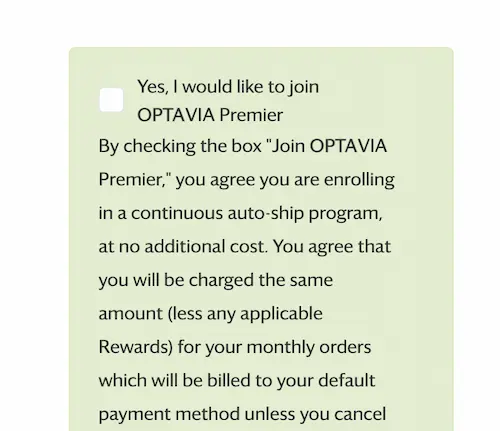If you’re looking for information on the Optavia lawsuit, you’re in the right place.
Optavia has gained popularity in recent years, but unfortunately, there have been lawsuits, complaints, and safety concerns from its users.
In 2012, a class action lawsuit was filed against Optavia and Take Shape For Life, alleging false and misleading claims about their diet products.
In 2022, another lawsuit was filed for enrolling consumers in their weight loss auto-shipment program without proper consent.
In this article, we dive (deep) into each of these claims and what can you do to protect yourself.

Why are there lawsuits against Optavia?
Over the years, Optavia received numerous complaints from unhappy customers who purchased their products and felt they were misled.
Have you ever wondered about the truth behind the claims made by weight loss companies?
Well, in 2012, Optavia’s parent company, Medifast, got in trouble because they were telling people that if they followed their diet plan, they could lose 2-5 pounds per week.
The problem?
Medifast didn’t have good evidence to back up that claim.
It wasn’t based on science or research. So the government said that they were misleading people with their ads. As a result, they had to pay a big fine of 3.7 million dollars!
What has changed?
Now, they have to use a different way of talking about how much weight you might lose.
They have to say that “the average amount of weight that people lose is 12 pounds”, according to Optavia’s disclaimer.
This way, people can make a more informed decision about whether or not they want to try Optavia’s weight loss plan.
In other words, if they want to make any claims about their products, they have to have proof that it’s true. They can’t just say things that aren’t true to try and sell more of their products.
Optavia Lawsuit and auto-renowal
In 2022, Optavia was in trouble again for not having the best business practices.
They have this “sneaky” thing where they enroll customers in an automatic renewal plan called “Optavia Premier” without telling them.
So, people end up getting charged hundreds of dollars every month without knowing it.
get people to buy their stuff and then convince those people to sell it to their friends and family. The problem is,
Crazy, right?
This is a big no-no and it’s illegal
The company is making a lot of money from this automatic renewal scheme, but it’s not fair to the customers who are getting charged without their consent.
The lawsuit is trying to make Optavia and its parent company, Medifast, take responsibility for what they’re doing and put an end to their sneaky practices.
One of the people who is suing them is a woman named Jamie Zeller, who was enrolled in Optavia Premier without knowing it and was charged for products she didn’t want.
Optavia and California’s Automatic Renewal Law
Optavia is facing a lawsuit because they’re being accused of violating California’s Automatic Renewal Law.
This law is in place to make sure that companies don’t charge consumers for ongoing subscription charges without their clear and explicit consent.
In this case, Optavia’s weight loss program, called Optavia Premier, can cost over $500 per month and customers are often unwittingly signed up for the program without proper disclosures.
According to the lawsuit:
“Optavia failed to provide the required disclosures both before and after customers signed up for the program.”
Zeller v. Optavia, LLC et al.
The law has strict requirements for companies to follow, both before and after purchase.
How does it work?
- Before a customer buys a product or service, the company MUST clearly and conspicuously disclose the automatic renewal plan, along with the terms and conditions of that plan, and obtain the customer’s affirmative consent.
- After the purchase, the company MUST send a confirmation email that includes the automatic renewal terms, cancellation policy, and information on how to cancel.
Optavia is being accused of not meeting these requirements. That’s why they’re being sued.
Optavia action class lawsuit details
Well, the problem lies in their enrollment process, which is quite misleading.
Let me explain.
When you select a product on the Optavia website, you’re directed to a checkout page where you are prompted to enroll in Optavia Premier.
However, the enrollment process is designed in a way that makes you think you’re not being signed up for auto-renewing shipments and charges.
Here’s the photo.

As I’ve explained earlier, the which is the company’s
As you can see, the option to enroll in Optavia Premier is already pre-checked.
It’s quite paradoxical because the process requires the customer to “opt-out”, which is the opposite of affirmative consent.
The customer has to opt out rather than opt-in, which is illegal.
It’s like being enrolled in a program by default, and the customer must actively unenroll to opt out.
Moreover, notice how the information about the Optavia Premier program is in the smallest font on the page.
It is set off to the side with the least contrast against the background compared to all the other text.
Why? Well, it makes it easy for customers to miss that they are being signed up for automatic renewal.
And then there is this “Congratulations!” banner.
See the photo below.

As you can see, the checkout page presents you with a banner stating “Congratulations! You are now enrolled in OPTAVIA Premier.”
This banner gives the impression that you win something or have been chosen for a special program, rather than being enrolled in an automatic renewal plan.
VERY sneaky trick, in my opinion.
Optavia coaches do not explain auto-renewal either
When you sign up for Optavia through a coach, the coach doesn’t even tell you about the automatic renewal program.
When customers are enrolled through coaches, the disclosures are even more deficient.
“Coaches systematically fail to even disclose to consumers that they are being auto-enrolled, much less comply with the detailed requirements of the Automatic Renewal Law. This is because Optavia’s coach training materials systematically (and intentionally) fail to train coaches to comply with the Automatic Renewal Law.”
Zeller v. Optavia, LLC et al.
Optavia’s buying process is designed to enroll customers in the automatic renewal program without providing the necessary disclosures or obtaining affirmative consent.
This is a violation of California’s Automatic Renewal Law.
What has changed?
After facing lawsuits and accusations of dishonest business practices, Optavia has made changes to its subscription policy.
One of the major changes is the option for customers to enroll in the Premier plan with auto-renewal being left unchecked by default.
What does it mean?
This means that you’ll have to actively choose to enroll in the Premier plan, instead of being automatically enrolled without your knowledge.
Here’s the photo.

In my opinion, Optavia’s new approach provides greater transparency and gives you more control over your subscription.
By doing this, Optavia is taking a positive step towards building trust with you and addressing any accusations of dishonest business practices that have been made against the company in the past.
If you choose to join OPTAVIA Premier, you will be enrolling in a continuous auto-ship program, but you will be informed of this fact beforehand.
What about the cancellation policy?
The cancellation policy for Optavia is outlined in the company’s terms and conditions.
In theory, you can cancel their subscription at any time, but you have to give a 30-day notice before the end of your current subscription period.
However, some customers have reported issues with the cancellation policy.
According to Better Business Bureau (BBB), some people have said that they were charged after canceling or couldn’t cancel their subscriptions at all.
For example, in one of the recent BBB complaints, one customer said that they canceled their membership and subscription plan on January 31st, and received confirmation on February 1st.
But on February 4th, they got an email saying that their order was being processed, and then on February 7th, they were charged over $400, even though they had already canceled.
They’ve been trying to get their money back for almost a month now, but keep getting told that the company is investigating.
The bottom line
Optavia has faced legal action and negative feedback from customers about its automatic renewal program and cancellation policy.
However, Optavia has made changes to its subscription policy to provide more transparency to customers, which is a good thing.
But still, be aware of their policies and read the terms and conditions carefully before making any purchases or subscriptions.
